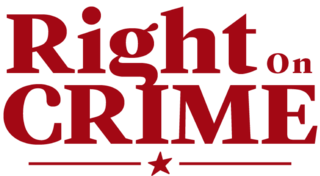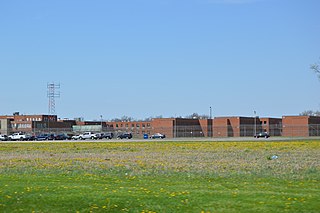
Charles Wendell Colson, generally referred to as Chuck Colson, was an American attorney and political advisor who served as Special Counsel to President Richard Nixon from 1969 to 1970. Once known as President Nixon's "hatchet man", Colson gained notoriety at the height of the Watergate scandal, for being named as one of the Watergate Seven and also for pleading guilty to obstruction of justice for attempting to defame Pentagon Papers defendant Daniel Ellsberg. In 1974, Colson served seven months in the federal Maxwell Prison in Alabama, as the first member of the Nixon administration to be incarcerated for Watergate-related charges.

Incarceration in the United States is one of the primary means of punishment for crime in the United States. In 2021, over five million people were under supervision by the criminal justice system, with nearly two million people incarcerated in state or federal prisons and local jails. The United States has the largest known prison population in the world, it has 5% of the world’s population, and 20% of the world’s incarcerated persons. China, with four times more inhabitants, has fewer persons in prison. Prison populations grew dramatically beginning in the 1970s, but began a decline around 2009, dropping 25% by year-end 2021.

The prison abolition movement is a network of groups and activists that seek to reduce or eliminate prisons and the prison system, and replace them with systems of rehabilitation and education that do not focus on punishment and government institutionalization. The prison abolitionist movement is distinct from conventional prison reform, which is intended to improve conditions inside prisons.

Prison reform is the attempt to improve conditions inside prisons, improve the effectiveness of a penal system, or implement alternatives to incarceration. It also focuses on ensuring the reinstatement of those whose lives are impacted by crimes.
Prison Fellowship International (PFI) is a Christian international non-governmental organization of national prison fellowship organizations from 112 countries. The organization is based in Washington D.C., United States, and its current president is Andy Corley.

The American juvenile justice system is the primary system used to handle minors who are convicted of criminal offenses. The system is composed of a federal and many separate state, territorial, and local jurisdictions, with states and the federal government sharing sovereign police power under the common authority of the United States Constitution. The juvenile justice system intervenes in delinquent behavior through police, court, and correctional involvement, with the goal of rehabilitation. Youth and their guardians can face a variety of consequences including probation, community service, youth court, youth incarceration and alternative schooling. The juvenile justice system, similar to the adult system, operates from a belief that intervening early in delinquent behavior will deter adolescents from engaging in criminal behavior as adults.

Incapacitation in the context of criminal sentencing philosophy is one of the functions of punishment. It involves capital punishment, sending an offender to prison, or possibly restricting their freedom in the community, to protect society and prevent that person from committing further crimes. Incarceration, as the primary mechanism for incapacitation, is also used as to try to deter future offending.

A prison, also known as a jail, gaol, penitentiary, detention center, correction center, correctional facility, or remand center, is a facility where people are confined against their will and denied their liberty under the authority of the state, generally as punishment for various crimes. Authorities most commonly use prisons within a criminal-justice system: people charged with crimes may be imprisoned until their trial; those who have pled or been found guilty of crimes at trial may be sentenced to a specified period of imprisonment.
The InnerChange Freedom Initiative (IFI) was an American Christian prison program operated by Prison Fellowship International (PFI), a 501(c)(3) nonprofit established by Chuck Colson. The program was closed in 2016.

The alternatives to imprisonment are types of punishment or treatment other than time in prison that can be given to a person who is convicted of committing a crime. Some of these are also known as alternative sanctions. Alternatives can take the form of fines, restorative justice, transformative justice or no punishment at all. Capital punishment, corporal punishment and electronic monitoring are also alternatives to imprisonment, but are not promoted by modern prison reform movements for decarceration due to them being carceral in nature.
Prison overcrowding in the United States is a social phenomenon occurring when the demand for space in a U.S. prison exceeds the capacity for prisoners. The issues associated with prison overcrowding are not new, and have been brewing for many years. During the United States' War on Drugs, the states were left responsible for solving the prison overcrowding issue with a limited amount of money. Moreover, federal prison populations may increase if states adhere to federal policies, such as mandatory minimum sentences. On the other hand, the Justice Department provides billions of dollars a year for state and local law enforcement to ensure they follow the policies set forth by the federal government concerning U.S. prisons. Prison overcrowding has affected some states more than others, but overall, the risks of overcrowding are substantial and there are solutions to this problem.

Right On Crime is an American conservative criminal justice reform initiative in the U.S. that aims to gain support for criminal justice reform by sharing research and policy ideas, mobilizing leaders, and raising public awareness. Right On Crime reforms are focused on "reducing crime, restoring victims, reforming offenders, and lowering taxpayers' costs." The initiative primarily focuses on nine issues: prosecutorial innovation, correctional leadership, over-criminalization, civil asset forfeiture, juvenile justice, adult probation, parole and re-entry, law enforcement, and victims' rights. Right On Crime is a campaign of the Texas Public Policy Foundation, a conservative think tank. After its founding in Texas, Right On Crime has contributed to many criminal justice reforms in over 38 states, working with bipartisan partners throughout the country.

Incarceration prevention refers to a variety of methods aimed at reducing prison populations and costs while fostering enhanced social structures. Due to the nature of incarceration in the United States today caused by issues leading to increased incarceration rates, there are methods aimed at preventing the incarceration of at-risk populations.

Criminal justice reform seeks to address structural issues in criminal justice systems such as racial profiling, police brutality, overcriminalization, mass incarceration, and recidivism. Reforms can take place at any point where the criminal justice system intervenes in citizens’ lives, including lawmaking, policing, sentencing and incarceration. Criminal justice reform can also address the collateral consequences of conviction, including disenfranchisement or lack of access to housing or employment, that may restrict the rights of individuals with criminal records.
Prisoner reentry is the process by which prisoners who have been released return to the community. Many types of programs have been implemented with the goal of reducing recidivism and have been found to be effective for this purpose. Consideration for the conditions of the communities formerly incarcerated individuals are re-entering, which are often disadvantaged, is a fundamental part of successful re-entry.
Osborne Association is a non-governmental, multi-service, criminal justice reform, and direct service organization. Osborne runs programs for people who have been in conflict with the law and their families. It operates from community offices in Brooklyn, The Bronx, Buffalo, Manhattan, and Newburgh, New York, White Plains, New York, Troy, New York and inside more than forty New York State prisons and jails. They work with the families and communities of incarcerated individuals to try and redress harm done by the criminal justice system, whilst also working to reform the system by challenging racist policies and retributive justice.

The Marion Correctional Institution (MCI) is a minimum- and medium-security prison for men located in Marion, Ohio, has a rich history dating back to its establishment in 1948. The institution's origins trace back to its location on land previously used for WWII German prisoners of war barracks. Over the years, it transformed into a facility that housed inmates transferred from other correctional institutions, leading to its construction as the Marion Correctional Institution in 1952. The institution has witnessed various innovative inmate programs, legal interventions, and significant events that have left a lasting impact.

Norway's criminal justice system focuses on the principles of restorative justice and the rehabilitation of prisoners. Correctional facilities in Norway focus on maintaining custody of the offender and attempting to make them functioning members of society. Norway's prison system is renowned as one of the most effective and humane in the world.
Second Chance Month, observed in the United States during April since 2017, is a nationwide effort to raise awareness of the collateral consequences of a criminal conviction, and unlock second-chance opportunities for people who have completed their sentences to become contributing citizens. The awareness effort is led by Prison Fellowship, the nation's largest nonprofit serving prisoners, former prisoners, and their families, and an advocate for justice reform. Activities include promoting public awareness and encouraging employers to become second-chance employer.

Decarceration in the United States involves government policies and community campaigns aimed at reducing the number of people held in custody or custodial supervision. Decarceration, the opposite of incarceration, also entails reducing the rate of imprisonment at the federal, state and municipal level. As of 2019, the US was home to 5% of the global population but 25% of its prisoners. Until the COVID-19 pandemic, the U.S. possessed the world's highest incarceration rate: 655 inmates for every 100,000 people, enough inmates to equal the populations of Philadelphia or Houston. The COVID-19 pandemic has reinvigorated the discussion surrounding decarceration as the spread of the virus poses a threat to the health of those incarcerated in prisons and detention centers where the ability to properly socially distance is limited. As a result of the push for decarceration in the wake of the pandemic, as of 2022, the incarceration rate in the United States declined to 505 per 100,000, resulting in the United States no longer having the highest incarceration rate in the world, but still remaining in the top five.









